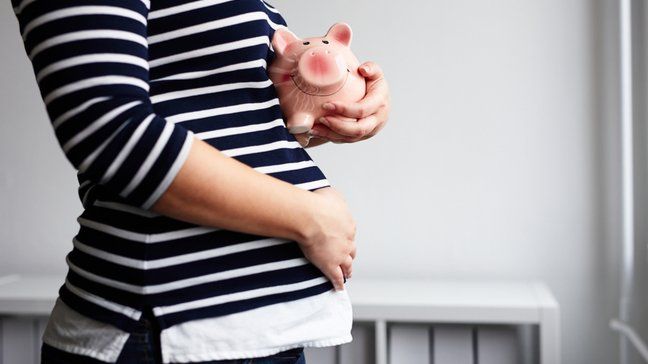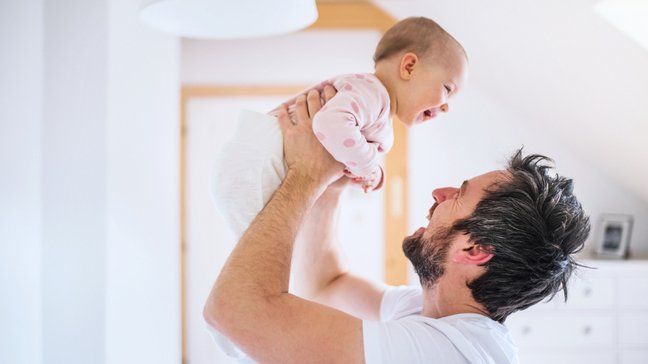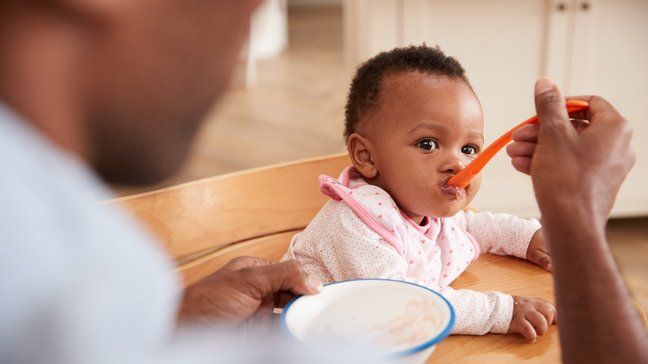Having a child is an exciting time in life! From decorating the nursery and buying children’s books to watching them walk down the aisle at their graduation, there are a lot of decisions to make.
One of the first things you should consider is the financial impact that bringing a child home will have on your budget.
It’s no secret that babies are expensive. Some of the costs are ones you expect, like diapers and daycare. There are also expenses you’ll have to cover that you might not think about, like those cute maternity clothes you’ll need as you grow out of your current wardrobe.
And jumping ahead about 15 years, have you thought about how much your car insurance will increase when you have a teenage driver in the house?
There are emotional costs, too. Before having a baby, you can enjoy frequent nights out with friends, sleeping past 7 a.m., and extra money in your budget. But once you add a new member to the family, your life will revolve around sleepless nights, feeding schedules, and daycare costs.
But don’t let that discourage you…..seriously!
Raising a kid is one of the most rewarding experiences in life. With a little advanced planning, you can increase your savings and prepare your budget now to make managing your money easier after the baby is born.
How to calculate the costs of having a child

If your budget is already tight, having a baby will put an additional strain on your finances. Even though the costs of raising a child are different for everyone, you can plan ahead to reduce the impact on your budget.
For instance, you may consider planning for:
- Increased electricity and utility bills since you’re spending more time at home. As your child gets older you should account for higher bills, as they will use more resources on their own.
- Higher grocery expenses because you’re eating at home more often or buying more convenience foods to save time in the kitchen.
- A rise in health insurance costs from adding another family member to the plan.
- Adding costs to hire a babysitter to your budget to enjoy some alone time with your partner.
To help you pin down what expenses you can anticipate when planning to bring a child into your home, here are some of the costs you’ll want to consider.
Cost of conceiving or having a child by alternative means
For some, the cost of conceiving a child, or having one by alternative means like adoption or in vitro fertilization, can be expensive. Depending on your situation, you could expect to spend upwards of ,000 to have a child.
In cases of infertility, these costs can sometimes be unexpected but are not all that uncommon.
Prenatal care and childbirth expenses

With prenatal care, epidurals, and hospital stays, giving birth doesn’t come cheap. On average, the cost of birth without complications (i.e. c-section, etc.) is $10,657 according to a 2011 report from the National Partnership for Women and Families.
If there are complications or if the delivery results in a cesarean, those costs can triple, although the amount you pay largely depends on your health care coverage.
With most plans requiring you to meet the annual deductible before they pay for childbirth expenses, that can add up to bills of up to $2,000 or more.
Health insurance
Adding a baby to your family also means that your health insurance costs are going to rise. An important part of keeping your baby healthy, health insurance helps cover the various check-ups and vaccinations that your child may need.
For the first thirty days of your child’s life, they will be insured through their mother’s health insurance plan.
After that period, parents are responsible for enrolling their baby in health insurance. Because having a baby is a qualifying life event, parents are able to do this through their current health insurance plan if they so choose.
When calculating the costs of raising a child, make sure that you explore the cost of health insurance. To get a better understanding of how your premium will be affected by adding a child to your policy, give your insurance company a call for a quote.
If you are on the hunt for a better plan for your family, here are two of my favorite resources.
Policygenius
 Policygenius is one of the greatest resources for those in search of a new health insurance plan. With a track record that has brought over $25 billion worth of insurance coverage to tens of thousands of families, they are a broker that you can trust.
Policygenius is one of the greatest resources for those in search of a new health insurance plan. With a track record that has brought over $25 billion worth of insurance coverage to tens of thousands of families, they are a broker that you can trust.
From finding a health insurance quote to assistance applying for a plan, Policygenius has your back. Through easy to fill out surveys that are used to find you the best rates, they keep their commitment to making insurance simple.
Maternity and paternity leave

The only option parents have for time off after having a baby is the Family Medical Leave Act (FMLA), which mandates US employers give 12 weeks of unpaid leave.
You can save both vacation and sick days to help cushion your budget, but that won’t cover the weeks or more you’ll go without getting a paycheck.
To prepare your finances, you can limit your expenses now and put away extra money in your emergency fund.
Baby stuff
Despite what magazines and commercials lead you to believe, you don’t have to spend a fortune on baby stuff.
But even if you stick to the minimum, you’ll need to plan room in your budget for the essentials. Here are some essentials that everyone should count on purchasing for their child.
Car seat
Buying a car seat is a must. Some babies have more than one in the first year, depending on how fast they grow. Infant seats are around $100, but you can spend up to $300 or more depending on the brand and features.
If purchasing a car seat second hand, or being gifted one by a friend, make sure that the car seat is not expired. Due to the stress put on car seats in cars and constantly improving technology, you can expect most car seats to last around six years.
Diapers
When your child is a baby, diaper costs can be one of the biggest expenses.
Disposable diapers are the ultimate in convenience, but cloth diapers are less expensive overall. Since the majority of daycare centers don’t accept cloth diapers, you could be stuck with paying $70 to $80 a month for disposable diapers.
Feeding your child

A can of infant formula lasts about a week. At the cost of around $25 per can, that adds up to $100 a month to feed your new baby. If you decide to feed your baby formula, you can cut down on the cost by buying in bulk at your local wholesale club.
If you choose to breastfeed, you’ll need a breast pump when mom returns to work and those range in price from $50 to $250.
After your child begins trying new foods, you will find yourself needing to regularly buy baby food. Some even make their own and are able to save a few bucks.
Unsurprisingly, your child’s teenage years are often the time that you will spend the most on food.
Clothing
Buying from consignment shops or getting hand-me-downs from friends and relatives is a huge cost saver when it comes to buying clothes for your child. But you can still expect to spend a couple of hundred dollars each year when raising a baby because they often grow a half-dozen sizes or more in the first few years.
As your child gets older and starts to develop a style of their own, clothing costs can go way up. You may consider bringing your child with you to thrift stores to pick out their own clothes or teach them how to shop clearance sales. Not only will this help save you money, but it can also teach them to be frugal when making purchases with their own money.
Entertainment

Keeping your child entertained can not only help aid in their development, but also give you a break! From sensory toys to books, and even video games, you can expect to be dishing out money throughout your child’s life.
Of course, there are ways to keep your child entertained without breaking the bank. Getting involved in low-cost community activities and joining your local library is a good start.
Bigger home
When adding a baby into the mix, you may want a bigger house to make more room for your growing family. Sure, having a house with plenty of space for your kids is nice, but a higher house payment might stretch your budget too thin, and may not be the strongest investment.
Plus, there’s a lot of stress that comes with having a baby, and moving can take you away from the emotional support system you already have in place.
If your home is truly going to burst if you add another member to it, the cost of a new home should be a part of your calculations.
When it comes time for you to take out a new mortgage, Reali Loans can help you get started.
Reali is dedicated to making the mortgage process simple and fast. Through their easy to understand application process, you can easily find a loan that is perfect for your particular situation.
By cutting out brokers and banks, Reali can even save you money on commissions and fees often associated with the mortgage process.
Protecting your child’s future

When you have a child, you want to protect them and make sure that they have the best future possible. Sometimes this costs a bit of money, but the security that it will provide for your family is invaluable.
In order to ensure your child’s needs are taken care of, consider insuring yourself and putting your wishes into writing.
Life and long-term disability insurance
Though it isn’t something you want to think about, some pregnancies have complications that require moms to take more time off work.
Whether it’s from a cesarean or postpartum depression, having life insurance and long-term disability insurance can help when faced with unforeseen difficulties.
To find all of your life insurance rates in one place, check out Policygenius.
Policygenius is an independent insurance broker which means that they are not affiliated with any particular insurance company. They help you find the best policy to fit your needs, then let you shop top insurers to find the best rates.
Plus, they are completely free to use and the application takes just a few minutes.
You can also opt to get term life insurance through Policygenius’s partner, Brighthouse SimplySelect℠.
You won’t be required to take a medical exam, all you need to do is take an over-the-phone questionnaire with one of Policygenius’s agents. In three to four days, you could have the low-premium policy that insures you for up to $2 million.
Another option worth considering is Breeze. Like Policygenius, you’ll input some information about yourself and get rate quotes.
Breeze doesn’t provide quotes from outside insurers, though. Your insurance policy will be underwritten by Assurity, a highly-rated insurer in the disability market.
Breeze provides one product: long-term disability insurance, which covers you for multiple years. If your pregnancy requires you to go on bed rest, the policy will kick in and cover you for the necessary timeframe.
To get started with Breeze, you’ll just fill out an application and review your rate quote. There is no obligation to purchase.
Create or amend your will and choose a guardian
When you have a baby, there’s one more item that you absolutely have to do which is to create a will if you don’t already have one, and also be sure that you have named a guardian for your child. Yes, this is one more additional cost to having a baby that is one that – too often than not – is simply forgotten about until much later on.
It’s true that it’s often something that you want to put off working on cause the conversation is a tough one. On the other hand, you will want to plan who will look after your children if something should happen to you. And you’ll want to be sure they are cared for with all of your assets.
Babysitting and childcare
Connecting with your partner is essential to the health of your relationship. To keep the romance alive after the baby is born, you’ll need to hire a babysitter to get time away.
Whether you enjoy a fancy night out or head to the local coffee shop, paying a babysitter can cost between $10 to $20 an hour. If you aren’t lucky to have a relative or friend nearby who really loves to watch your kid, considering the cost of babysitting is a must.
If you and your partner’s jobs bring you outside of the home, you will also want to take childcare costs into account. With childcare costing over ,000 a month for many parents, it is a large expense that you should be prepared for.

When your child starts school, there’s more than the cost of paper and crayons to consider.
Playing a sport like football, or joining the swim team, can total around $300 each year. And if you want your child to learn the piano, that can easily set you back $100 or more a month depending on the cost of lessons where you live.
On top of school supplies and extracurriculars, you can expect to spend money on:
- Class trips.
- School lunches.
- School photos.
- Cap and gown purchases.
- Prom tickets and attire.
- Yearbooks.
- Uniforms (if applicable).
Tuition
If you plan to send your child to a private school, don’t let yourself be surprised about the cost of tuition when you enroll them. Some private schools charge tuition that is on par with state universities!
The obvious way to avoid paying for high tuition is to send your child to public school. If this is not an option for your family, be prepared to work hard at finding scholarships and grants that can help offset the price.
Driver’s education and teen driving insurance
Sending your child out on to the road for the first time can be nerve-racking, but is necessary to help them turn in to productive adults. In order to do this, it is important to ensure that your kid is properly educated on how to operate a vehicle and insured.
Driver’s education
While driver’s education used to commonly be offered as an elective in high school, that is becoming less and less common. This means that parents are often footing the bill for educating their children on the ways of the road.
Depending on the area that you live, plan on spending upwards of $500 per child.
Teen driving insurance
Adding your teen to your car insurance policy will undoubtedly increase your premiums. To save some money, ask your insurance company about discounts for getting good grades, taking driver’s education, or raising your deductible.
Also, keep in mind that letting your teen drive an older, more practical vehicle costs less to insure than a newer model.
If your kid is getting ready to go to college, consider kicking them off of your insurance if it’s too high.
Since they shouldn’t be driving too much, a company like Metromile, which is a pay-per-mile company offers affordable insurance.
While they don’t offer a ton in the way of discounts, your child’s insurance cost will be significantly lower (assuming they have a clean driving record) with Metromile, since they’ll only pay insurance on the miles they drive.
College

The costs of college have skyrocketed in recent years, and the trend is expected to continue.
With tuition anticipated to inflate 5% per year, costs for a baby on the way will rise to $185,259 for a four-year public college education. This is in comparison to children who are headed off to college now, who can expect to pay $76,979.
To cut down on the costs your child will pay for their education, parents may consider opening a 529 account, which is specifically for college savings. It is important to remember that 529s can reduce the amount of financial aid that will be available to your child.
If you are worried that you will not be able to fully fund your child’s education through a 529 account, consider opening a Roth IRA instead. These accounts can be withdrawn from penalty-free to pay for education.
Summary
Having kids can be expensive, but it doesn’t have to be. Stick to the necessary essentials, and shop around for discounts and deals on baby-related expenses that could otherwise easily spiral out of control.
Spending some time now to manage your money wisely will ease the stress on your budget, letting you focus on loving your new bundle of joy.